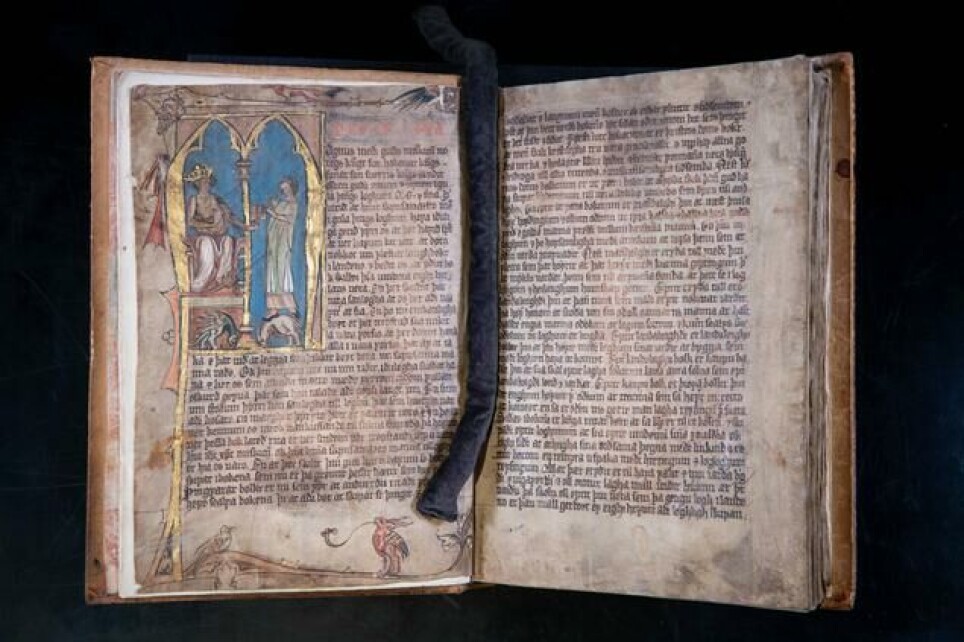THIS ARTICLE/PRESS RELEASE IS PAID FOR AND PRESENTED BY The Centre for Advanced Study (CAS) - read more

Politics, law and society in the High Middle Ages
How did the introduction of legislation as an instrument of governance affect politics, law and society in the High Middle Ages? Researchers at the Centre for Advanced Study (CAS) aim to give us the answers.
The Code of the Norwegian Realm of 1274 is one of the wonders of European Medieval legal history and an important event in Norwegian history. The law was one of the first law codes in Europe covering the territory of an entire realm. The law also regulated many areas of society, and the scope of its contents makes the law a unique artifact of its time.

Despite the historical uniqueness, and the political, legal and social importance of the Code of 1274, it remains largely unexamined. This will change as scholars within the fields of history and law join forces at the Centre for Advanced Study (CAS) to find out more about the contents and consequences of the Code of 1274.
Erik Opsahl, professor of history at the Norwegian University of Science and Technology (NTNU), and Jørn Øyrehagen Sunde, professor of law at the University of Oslo (UiO), are leading the CAS project, which they have titled Social Governance Through Legislation.
The project examines how politics, law and society changed with the introduction of legislation as an instrument of governance in the High Middle Ages. It will do so on three different levels: law in politics, structures of governance and the legal situation of marginal groups.
“We are studying the beginning of the political use of legislation as an instrument for social governance in Norway and its consequences,” Øyrehagen Sunde said. “In addition to looking at what happened, we will investigate how the Code of 1274 has been understood and interpreted by researchers in the 1800-1900s.”
Social governance through legislation
The Code of 1274 represents the start of social governance through legislation in Norway as we know it today.
“We are interested in people’s trust in the law, their confidence in the exercise of power, and why people in Norway today tend to see regulation by law as a good thing,” Øyrehagen Sunde said.
“People’s trust in the law is not something that has come by itself,” Opsahl said. “The belief that the law is a guarantee for justice is something that has developed over hundreds of years. Since the Code of 1274 the law has been present and understood as a regulating, balancing and guaranteeing factor in Norwegian society.”
The Norwegian people’s strong belief in rules has deep historical roots going all the way back to the Code of 1274. The handling of the coronavirus pandemic illustrates this belief.
“Norwegians’ strong belief in rules and regulation by law, which is not necessary always a positive thing, was highlighted under the coronavirus pandemic, and by how most people followed the government’s restrictions and recommendations closely,” Øyrehagen Sunde said. “This was not the case in all countries, and often for good reason given their respective historical experiences with exercise of power and regulation by law.”

The contents of the Code of 1274
Legislation in itself was not something new in Europe in the High Middle Ages. What makes the Code of 1274 unique is the scope of its contents and area of jurisdiction.
“With the Code of 1274 King Magnus VI the Law-Mender tried to regulate as many areas of society as possible under one legislative and governing power,” Opsahl said. “This was something qualitatively new at the time.”
“It is the scope of the law and the fact that law codes covering the territory of an entire realm had only been issued in a few places in Europe before that makes it so unique for its time,” Øyrehagen Sunde said.
The Code of 1274 consists of nine books with laws that regulate many areas of the life of all citizens. The field that was the most reformed was the area that we today call criminal law.
“King Magnus VI the Law-Mender’s Code of 1274 marks the transition from a society where conflict resolution is in the hands of the parties themselves to a society that has a conflict resolution system regulated by law,” Øyrehagen Sunde said. “The Code makes blood vengeance illegal and introduces a penalty system that does not allow corporal punishment, except for, sometimes, the crime of theft.”
In addition to the area of criminal law, areas such as commercial law and welfare law, as we would call them in modern terms, were also reformed by the Code of 1274.
“One important example of the contents of the law is the inclusion of regulations for the poor with the aim of taking care of the weakest in society,” Opsahl said. “To include this in royal legislation is rather unique in a European context at the time.”
The Code also provided rules for the election of kings.
“The Code states unequivocally that there shall only be one king of all of Norway, not several as we had earlier, and that the throne is to be inherited,” Opsahl said. “This differs from other Nordic countries such as Denmark and Sweden at the time, where the king was elected. This shows that the power of the throne in Norway was strong.”
The uniqueness of the Code of 1274: Structures of governance
The project will compare the Code of 1274 with the development of legislation in other countries in Europe, both on a political and legal level.
“What has surprised me the most so far in our work is how unique the Code of 1274 actually is,” Øyrehagen Sunde said.
The law was radical at its time not only in terms of its contents and scope, but also in terms of how it was practiced. For example, the Code of 1274 allows for local adaptations and interpretations of the law.
“When the central authority, the king, gave the Code of 1274 to the local authorities, he said: Here is the law, and you must use and follow it. But you can interpret the law, and if it seems unreasonable in a specific case, you can put it aside and come to a local agreement,” Øyrehagen Sunde said.
“It is this flexibility that makes the law so brilliant, because it creates a dialogue and an interaction between the king and the local authorities. This made it easy for local authorities to accept the law and to use it, because if they disagreed with it they could reach local agreements and deviate from the law.”
The Code of 1274 institutionalised a dialogue between the local and central authority. As a result, the Code became known by all sections of society and was used locally.
“We can see from our sources that the Code of 1274 was known among Norwegian farmers, as well as the Norwegian elite in the Middle Ages from 1300-1500,” Opsahl said. “They use the rules given by the law and the law’s terminology.”
“The Code of 1274 becomes the channel of dialogue in the society and more important than raw power or violence. When Norway later in the Middle Ages was in union with Denmark and Sweden, from 1397, the union monarch primarily tried to promote his policy in Norway through the Norwegian law.”
The fact that local authorities and people used the law as they did is quite remarkable in a comparative perspective.
“It is a big achievement to make a code like this, but it is an even bigger achievement that it was so widely used,” Øyrehagen Sunde said.
The legal situation of marginal groups
The project will investigate how the Code of 1274 influenced the legal situation of marginal groups of society such as women, children and the poor.
“It is interesting to study marginal groups because they were not represented in the bodies of governance and hence had no power to influence the legal decision-making in favour of a stronger legal position for themselves,” Øyrehagen Sunde said. “We will study how the law code took care of these vulnerable social groups and the consequences of the Code of 1274 for their legal position, and study these groups’ legal situation in a Nordic and European comparative perspective.”
This autumn semester, the project has a Nordic comparative perspective. Next semester, the comparative perspective will be European.
Opsahl and Øyrehagen Sunde have gathered a team of scholars from different countries in Scandinavia and Europe to join the project. All of them will be present at the Centre for longer or shorter periods of time during the 2021/22 academic year.
By bringing together scholars from different academic disciplines and countries, the project leaders hope that the insights produced by the project will be transported into different research milieus and ensure a continued investigation on the topic in different contexts long after the project has left the Centre.
Before that, there is still much research to be done by the group while at CAS.
See more content from The Centre for Advanced Study:
-
Electrons, laser pulses and the properties of matter
-
Dissecting the current debates on prehistoric migration
-
Which parts of language are universal and present in signed and spoken languages, and which depend on the channel of communication?
-
Mother-to-child microbial transmission: important for human health and challenged by modern lifestyle
-
What is the role of morality, democracy and experts in policymaking?
-
Understanding mathematical motives





































